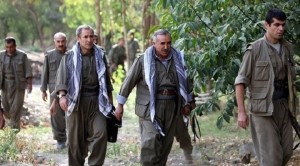 The civil war in Turkey has not started yet, but it is knocking on the door with the recent outbreak of violence and fighting between Turkey and the Kurdish Workers Party (PKK), which halted the already fragile peace process between them. However, the increase in violence should be seen more as an outcome, rather than a cause, of the peace freeze. It is an outcome due to the decline in mutual trust between the Kurds and the Turkish government, a decline for which there are domestic and global reasons. The Kurds are a nation without state, if by nation I mean a people who are ethnically distinctive and now have written for them a history of political and military struggle to achieve self-rule and cultural autonomy. After the collapse of the Soviet Union the Kurds became the largest ethnic group in the world without a nation state of its own. The obstacles to Kurdish nationhood, however, have been in part due to the Kurds themselves.
The civil war in Turkey has not started yet, but it is knocking on the door with the recent outbreak of violence and fighting between Turkey and the Kurdish Workers Party (PKK), which halted the already fragile peace process between them. However, the increase in violence should be seen more as an outcome, rather than a cause, of the peace freeze. It is an outcome due to the decline in mutual trust between the Kurds and the Turkish government, a decline for which there are domestic and global reasons. The Kurds are a nation without state, if by nation I mean a people who are ethnically distinctive and now have written for them a history of political and military struggle to achieve self-rule and cultural autonomy. After the collapse of the Soviet Union the Kurds became the largest ethnic group in the world without a nation state of its own. The obstacles to Kurdish nationhood, however, have been in part due to the Kurds themselves.
The Kurds have the misfortunate of occupying lands ruled by four repressive countries: Turkey, Iraq, Iran, and Syria. Kurds are Muslims but are being oppressed by Muslim nations. Competition among regional and global power struggles and in international politics has prevented the Kurds from having their own self-rule. Turks, Persians, and Arabs alike have sought to subjugate the Kurds for strategic purposes, to gain access to economic resources, and to establish hegemonic power. These groups want to overpower them because the Kurds have the two most precious resources, water and oil, and the other Middle Easterners do not want them to have these commodities. For example, the Kurds in Northern Iraq are on the precipice of declaring an independent state, separate from Iraq; power players created the ISIS, and now the Kurds are victims to the ISIS attacks. The Kurds have had enemies for particular reasons, and they have had them for a long time, but globalization and the Arab Spring gave the Kurds a big opportunity to be part of the New Middle East Map. But among the obstacles to Kurdish independence have been the Kurds themselves because they have a dual problem of always being betrayed by their friends and of not being united among themselves, easily forgetting the past and never learning from history. For example, the relations of the Democratic Union Party (PYD) with the Kurdish Regional Government (KRG) have not been very good because they have a power struggle among each other as well, because the KRG thinks it should be in control while the PYD leadership believes it should control the territory.
The Kurds have long been the object of imperial and superpower interests. In the past and now particularly, the Kurdish issue is a world issue. Without a Kurdish state in the Middle East, there will never be peace in the region. The PKK began their fight for independence in the late 1970s and have been struggling for greater autonomy and recognition of Kurdish rights within Turkey ever since. After three decades of conflict that took the lives of 40,000 people, displaced millions, burned villages, kidnapped people, and economically as well as socially brutalized a generation or more, the Turkish government realizes that a military victory is impossible. In 2013, the Turkish government and the founder of the PKK, jailed leader Abdullah Ocalan, declared a peace deal to find a resolution to the Kurdish issue, establishing an atmosphere of compromise especially in its relations with Iran and Turkey.
External powers, however, always use the Kurds for their national interest as Good Kurds and Bad Kurds. Good Kurds are those who help their national interests and bad Kurds are those who go against their welfare. For example, the PKK never killed or attacked any Americans or even Europeans, but both considered the PKK as a terror group, Turkey has developed successful bilateral relations with the KRG in Northern Iraq and, with this move, contributed to an overall policy establishing that independent Kurds cannot sell their oil to the Western market without going through Turkey; thus, for Turkey, those are the Good Kurds.
It is not Turkey’s job to decide how Kurds in Syria should live; the Kurds in Syria lived under the worst conditions ever. Kurds in Syria paid so much to live in dignity even though in 2002, the Kurds in Syria did not have even their own citizenship.One of the reasons Turkey broke the peace deal with the PKK was because it fears Kurdish autonomy in Syria on the grounds that the PYD, a pro-PKK organization, would seek a Kurdish corridor from Iraqi Kurdistan to the Mediterranean, thus becoming Bad Kurds.
Turkey wants the Kurds to be dependent on them all the time. That is why Turkey turns a blind eye on the ISIS forces and wants the ISIS to gain ground against the Kurdish forces in Syria. Turkey especially got nervous when the PYD Kurdish forces took back Tel Abyad from the ISIS in June 2015. The Kurdish PYD in Syria is getting more power, and Turkey does not want them to have so much dominance and then to have an autonomous region. If the PYD does have an autonomous region, then the Kurds will no longer be only dependent on Turkey, and they can have access to the outside world, not via Turkey. That is why Kobani has become a symbol of Kurdish resistance, and thus Turkey will not help the Kurds to fight against the ISIS there.
The second reason the Turkish government started a war with the Kurds again is that the general elections in Turkey were on June 7th this year. Despite a ten percent threshold, a Kurdish Party, the HDP, won a big victory in Parliament. The Kurds became more powerful, thus alarming the Turks. The battle of Kobane was the war of their very existence, and, as such, they were disappointed that the Turkish government did not support the Kurds to fight against the ISIS. Until additional elections occur, things will get worse and worse before they get better. Lots of Kurdish party members have been detained, and probably many Kurdish intellectuals will be arrested and kidnappings and disappearances will start again, because on July 20, a massive explosion rocked the Suruc district of Turkey in the Sanliurfa province, leaving 32 Kurdish people dead and many more injured. Right after the explosion, Turkey opened its airspace and its Incirlik base in Adana to coalition forces, and fighters jets began to bombard the group that Turkey had blamed for the Suruc bombing—the ISIS. Instead of bombing the ISIS, Turkey began bombing the PKK camps in Northern Iraq. Turkey tried to use western and American powers to go after the PKK, not ISIS.
The Middle East is becoming ever more political challenging and the worst is yet to come. Turkey is fighting domestically on three fronts, the PKK, the CHKPC, and the Gulen movement’s parallel state that is considered by the Turkish government as a terror group as well. Turkey needs to deal with a number of fault lines in domestic politics and has to strike a delicate balance in a challenging region.
The Arab Spring opened a new era for Kurds and Turkey in terms of its dealing with the region and with the Kurdish issue. The strong Kurdish group, the PYD, is the dominant group in Syria. This group has also established tough armed forces. The Turkish government does not want the Kurds in Syria, particularly the PYD with its growing strength around the Syrian border, to have an independent state and demographic changes in the region. Turkey’s peace with the PKK had domestic and regional goals. Domestically, it tries to give more room for politics to solve the Kurdish issue.Turkey knows the military is not the solution to the Kurdish problem, and because Turkey has been bombing the PKK for several decades, it has cost Turkey and the PKK dearly. Therefore, the cost of war and the result of going back to the policy of the old days are going to be very expensive for Turkey domestically and regionally. Turkey cannot afford to continue to fight with the PKK. Especially now, Turkey is competing for regional power over Iran, but the current Iranian nuclear deal with the US and other countries thwarts its advancement on this goal. So Iran will take advantage of the situation and support the PKK against Turkish interests in the region.
No conflict resolution process can be successful without both parties having sincerity and a clear vision for themselves and their roles in the post-conflict outcome. The problem is that Turkey does not care about the ISIS’s attempt to establish a quasi state, but it is deeply against the Kurds having independence from their own home. This is unacceptable to humanity and shows that Turkey is not sincere in fighting against the ISIS. The Kurds had been living under the worse circumstance as Ankara outlawed the use of their language, denied their separate identity as an ethnicity, forced them to change their names, imposed forced migrations from their homelands, and displaced them to areas strange to them. Of course, they suffered under poverty and unemployment as well. All these cruel policies destroyed the Kurds in social, economic, and cultural ways. In order to have peace in that region, or anywhere for that matter, and to have a lasting peace, it is important to win the hearts and minds of the decision makers rather than to use bombs for their personal interests.
Dr. Aland Mizell is President of the MCI and a regular contributor to Mindanao Times. You may email the author at:aland_mizell2@hotmail.com

